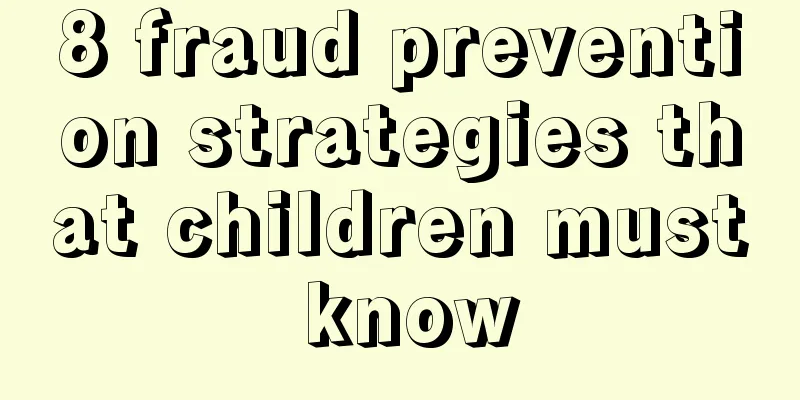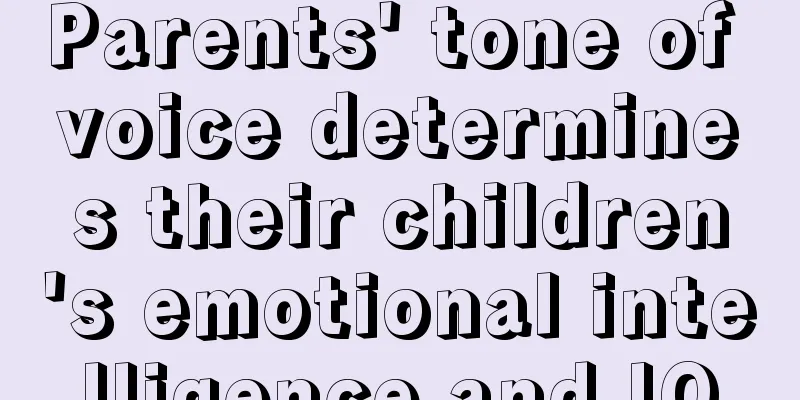8 fraud prevention strategies that children must know

|
1. Children's Songs to Protect Children The duty of the police is to prevent these children from falling into the tiger's mouth, but relying on the police alone is far from enough, so we hope that parents and grandparents will teach our children the little rhymes and little warnings we are going to talk about below, so that the children can learn them and know what to do when encountering various situations. For example, don't talk to strangers. We call it a warning, which is: Little white rabbit, go to school, Be polite when meeting strangers. Don't talk, just smile. Jump and go away quickly. At the beginning of the new semester, parents should teach this song to their children. They should keep silent, smile, and jump away quickly. This way, children will not be entangled by bad people and will reduce the risk of being deceived. These little songs are very useful to teach children, for example, there is another one below: I have a little flower dog at home. It won't leave if a stranger picks it up. Shake your head and wave your hands, I won't leave until I see my mother. I won't leave no matter who picks me up. It's the same in kindergarten. I can only leave if my mother picks me up. If anyone wants me to leave on the street, sorry, that's impossible. These are things parents must teach their children. What you need to do in advance is to make an appointment with the teacher and the child must be picked up by a designated person, and you cannot change the person at will. So when a child is walking to school, on the way to school or on the way home from school, someone comes up to him/her and wants to talk to him/her, what should he/she do? We also have a ballad, and the children must remember it: Catch up with the kids in front A person, going to school, Ask me something I don't know. Keep your head down and walk quickly. Catch up with the kids in front. If someone asks you, "What's your name, kid?", just lower your head and keep silent, just walk away. So we say that we should educate our children not to talk to strangers. But if the child does not talk to strangers, some people may say that the child is impolite. So we now propose that we should say no politely. For example, when we ask a child, "What is your name?" If the child is impolite, the child will say, "What's the point of me telling you?" This is not good. We saw a little fat boy and asked him, "Little boy, what is your name?" The little fat boy answered very cleverly. He thought for a while and said, "I'm sorry, my dad hasn't named me yet. He is very busy." It was clever and humorous, and it blocked the criminal. He just wanted to get close to the criminal, but he didn't even have a name, so he couldn't follow up. Another thing is to tell him a clearly false name, "Little boy, what is your name? My name is Little Red Riding Hood, or I am Big White Rabbit. If you want to know my name, then I will tell you. But at the same time, I also want you to know, don't try to trick me. I'm on guard and I don't want to talk to you." 2. Teach children to recognize directions We also need to teach children to recognize directions. For example, a child around three years old can walk back by himself if he knows the directions. My son lost it once when he was a kid. When he was three years old, I took him to the park to play. I told him to walk around for five minutes and then report to me. He said okay, "Walk around and report, walk around and report." But he forgot about it and didn't come to report. I was very scared. I said, "What should I do?" Quickly, because I am a policeman and I have many tricks. I went to the National People's Congress and found a group of college students. I told them to look for him separately. The children at the National People's Congress were all very good and they helped me look for him immediately. I ran home quickly and told my wife as soon as I got home that we should report to the police station first. Then I went back to the place where we were standing, but there was nothing we could do. After half an hour, we still had no idea, so I went back. When I got home, I saw him crying at the door. This child had walked two kilometers and was less than three years old, but he walked back by himself. Therefore, we must educate our children as early as possible so that they can recognize directions, distinguish between east, west, south and north, and have the ability to identify roads. Therefore, we say that we need to teach children to identify directions. You know, we Beijingers know east, west, south, and north. Some cities, such as Dalian and Tianjin, are not exactly south or north. So sometimes, many children don’t know what north and south are. So we need to teach them from an early age, and teach them to correctly recognize south and north. I have summarized a ballad to tell you how to teach your children: Remember the street number The sun is rising in the morning, The Big Dipper at night. Remember the street number. Can recognize east, west, south, north and center. How do we teach children to recognize directions? That is to say, when the child is about three years old, you should teach him what east, west, south and north are. You see, during the day you should teach him to look at the sun. We say that when the sun sets, it is in the west, and when the sun rises, it is in the east. At 12 noon, it is due south. If the child understands these, he will know the directions. When you look at the Big Dipper at night, how to recognize it? We teach the children that they should first have a general idea of the Big Dipper. The seven-star Big Dipper is a ladle. It is very easy for children to recognize it in the night sky. Count five stars forward from the edge of the ladle and you will find the North Star. The North Star is due north. If three-year-old children remember this and then remember the house number, they can generally find the direction. Also, if he gets lost during the day, he can look at the trees. The sunlight is stronger in the south, so the trees on the south side are lush, while the trees on the north side are obviously much worse. In addition, the north side is in the shade and has moss. So when you take your children out to play, tell them to identify north and south. In this way, children aged three or four can easily find the north and south. Children should learn these little skills from an early age, as they can come in handy if they encounter any situation. 3. Small phone book Parent Phone: Neighbor's phone number: Teacher's phone number: Friend's phone number: That is, what is dad's phone number, mom's phone number, home phone number, and also the phone number of a good neighbor. These numbers should be made known to, for example, a four-year-old child. If the child knows these phone numbers, once he encounters an unexpected emergency or is in danger, he will be able to notify others as soon as possible. So this is a preventive measure to prevent problems before they happen. This may seem small, but it can save lives at critical moments. 4. Prevention of long-term hostage or hijacking - Four Noes We also need to teach children the Four No Principles. What are the Four No Principles? The Four No Principles are a long-term prevention of hostages or hijackings, which are: Don’t talk to strangers. Don't show off your wealth. Don't go into the hotel in the middle of the night. Can't leave friends. These are some long-term prevention measures. What is long-term prevention? When the crime has not yet harmed me, we should teach children not to talk to strangers, not to show weakness or wealth. For example, carrying a school bag worth more than 500 yuan or wearing a pair of expensive Nike shoes should be avoided as much as possible. Do not go into the hotel in the middle of the night, do not let children go to entertainment venues at night, and do not leave their friends. They must stay with everyone and do not let others lure the tiger away from the mountain and defeat them one by one. 5. After a crisis If a bad guy kidnaps or swindles your child away, and the crisis has already occurred, what should you do? There are also some tricks after the crisis occurs. Hostage Rescue 1. The hijacking begins. Never get on the bus and escape decisively. (50%) The family members report the case immediately and remember the characteristics. 2. Hijacked on the way. Remember the roads, the times, the sounds. Leave a mark. (10%) 3. Stay calm at the hijacking scene (inside the car or room), eat, drink and sleep. (5%) Use a battle of wits and courage, deceive and pretend to be stupid, and win sympathy. 4. Forced attack and rescue: actively cooperate and escape decisively. (35%) 6. Recent hostage prevention Battle of wits and courage. Wisdom comes first. Listen more, watch more and remember it in your heart. Eat, drink and get enough sleep, Strive for sympathy and talk moderately. Learn to leave small marks, Be decisive when you run away. This is a short-term prevention strategy we have summarized. Once we encounter this kind of danger, our countermeasures mainly include the following: A battle of wits and courage requires children to mainly compete with the bad guys in wits, listen more, watch more, and remember in their hearts where you have been and where you are roughly. The child should have an idea in his mind. Remember what you hear and see, but don't say it out loud. Try to eat well, drink well, sleep well, get enough rest, maintain the best physical condition, strive for sympathy and talk moderately. Finally, learn to leave a small mark and be decisive when running away. Nowadays, many children don’t know how to run. You have to teach them to seize the opportunity and run away as soon as they see any sign of trouble. 7. 36 Hostage Stratagems 36 Hostage Stratagems 1. Rest while waiting for the opportunity to work. Eat, drink, sleep, conserve your energy and maintain your strength. 2. Pretending to be stupid but not crazy. Hide your identity and keep a low profile. 3. Make friends with those far away and attack those nearby. Divide the enemy and gain sympathy. 4. Smiling but with a dagger hidden in his heart. A battle of wits and courage, a battle of wits and intelligence is the main thing. 5. Escape from the shell. Cleverly disguise and escape decisively. So we say that we should teach children some tricks, called 36 strategies, which contain many strategies. The first one is called "wait for the enemy to tire out". What does "wait for the enemy to tire out" mean? If the child is caught by the bad guys, he should eat and drink, and he must not be afraid. There was a real case like this, where the criminals caught a child, and the child said, "Uncle, I'm hungry, you have to give me something to eat." He gave him something to eat. "Uncle, I'm thirsty, you give me something to drink." The child was very happy and not worried at all, because his grandmother taught him that we should not cause trouble in normal times, but we should not be afraid when trouble occurs, and we should still eat and drink as usual. Finally, the police came and rescued the child. Another thing is to pretend to be stupid and not crazy, and not show your edge. He will ask about your family situation, who your father is, and whether your father is rich, or whether he is a millionaire. Then you have to pretend to be poor and don't say too much to the criminal. Another way is to differentiate sympathy. You can ask him, "Uncle, do you have children? How old are your children? Then talk to him like this." Of course, this requirement is a bit high for children, but in fact, there are many ways to deal with children after they are caught. Finally, it is time to escape. Once you see the opportunity, escape decisively. There was a case where a criminal put a child on a tricycle and drove to an intersection with a traffic light. When the red light came on, the tricycle stopped. The child said it was too late and it was too fast, so he jumped off and ran away. The criminal had no time to catch him, so he escaped successfully. Warning: Learn to leave a small mark. Learning to leave small marks means that when you are being kidnapped, when you walk to an important place like a crossroads, you should take out something from your body and throw it away. Your parents and the police who are chasing you will follow this clue to find you. This is a very important trick. For example, in Germany, when people climb mountains, the climbers teach them that if you hold a red envelope or an umbrella in your hand and suddenly fall into a snow pit, you should quickly throw away the umbrella or red envelope the moment you fall into the snow pit. In this way, if someone comes from behind and sees the umbrella here, even though he can't find you, he sees that there is snow all around and he will try to dig you out. This is called learning to leave a personal mark. 8. Safety Fairy Tale A fairy tale every day An update on the concept of children's self-protection 1. There are also big bad wolves in crowded places In Britain, men are British and women are British. As for the little animals, they have a country called Mysterious Island. There is an endless forest in the mysterious island. The endless green grassland is full of unknown small yellow flowers. At the end of the forest is a magnificent cathedral. In the morning, a little rabbit went to school. His name was Rabbit. It took a long time to see a small animal. The forest was strangely quiet and a little cold. He met the pony Ponny and asked him, "Is there a big bad wolf in the forest?" The pony said, "No." The rabbit met the puppy Dog and asked him, "Is there a big bad wolf in the forest?" The puppy said, "No." He felt relieved when the little rabbit approached the cathedral. There is a beautiful organ in the church, and delicious snacks. I thought to myself, "There is no big bad wolf in the world." The little animals around the church were jumping around happily, as if it were a festival. An old woman with a headscarf came over with a smile, holding a red carrot in her hand. Just as the little rabbit was about to take the carrot, he suddenly saw a tail under the old woman's skirt. The little rabbit smiled and said, "I'm full." Then he jumped and ran away. Grandma Wolf howled in anger. It turns out that there are big bad wolves in crowded places. 2. Poisonous mushrooms It rains every day in the UK, it rains for a while and then stops for a while. So, every British person asks when they meet: "Did you bring an umbrella?" Just like when Chinese people meet, they will ask: "Have you eaten?" There are many umbrellas and mushrooms in the UK. Because umbrellas and mushrooms look very similar, I heard that they are cousins. Even beautiful mushrooms can be poisonous. Boy is a poor mushroom picking child. He lives in the big forest with his sick grandfather. Under a big tree, Baoer saw a huge mushroom. The head of the mushroom was as white as milk, and there were seven little red stars on the mushroom's umbrella. In the sunlight, seven little red stars are shining. Baoer is very happy. Carefully pick the mushrooms in a basket. Baoer thought: Such good mushrooms must be given to my sick grandfather. He ran home quickly, but unfortunately it rained heavily again. The seven little red star mushrooms grew bigger and bigger in the rain. Suddenly, Baoer discovered: drops of rain flowed down from the mushrooms, and the grass immediately turned yellow when it flowed over the trees, and the trees immediately dried up when they flowed over the trees. It turns out that the seven little red star mushroom is a highly poisonous mushroom. Sometimes, you will see a person wearing glasses, who looks like he loves science and looks like an uncle, but such people are not necessarily good people. Not everyone who looks like a good person is actually a good person. People and mushrooms are the same. 3. Knowing and Not Knowing There is a beautiful town in the southwest of England called Exeter, a town that rings bells when it doesn't rain. As soon as the rain stopped, the church bells rang; as soon as the bells stopped, the rain began to pour down again. Lion, the little lion, and Pigy, the little pig, made an appointment to go to school together. Ryan loves to talk the most, and his nickname is "Know-It-All". Biqi is not talkative, but very polite, and his nickname is "I don't know". The school is so far away. I have to pass by a grocery store selling strawberries and Swan Lake. They met an old man with a full white beard on the road. The old man asked Ryan, "Little boy, what's your name?" Ryan knew everything: "My name is Ryan, and I'm 9 years old." He added, "My father is the Lion King, and he's in Africa now. Grandpa, do you know Africa? My father sent me an African spear with a carved ebony shaft." The old man asked Biqi: "Little boy, what's your name?" The slow-witted pig thought for a long time before smiling and saying: "I'm sorry, my father hasn't given me a name yet!" The old man took out two pieces of chocolate and gave them to them. Ryan ate it without thinking, it was so delicious. Beach sniffed it with his long mouth and said, "Sorry, I have diabetes." Ryan fell asleep. There was a knockout drug in the chocolate. He was drugged and unconscious. The old man then sold him to a circus and transported him to faraway Africa. As for Beech, he still lived happily in the big forest and wrote a poem: "Big forest, small cabin, comfortable little fat pig." If someone asks Biqi, why are you so happy? Biqi will nod politely and say: "Say no to stranger!" 4. Christmas Gifts In Britain, every home has a fireplace, and in every fireplace there is a burning fire. Every Christmas, Santa Claus walks in from the fireplace. Because of the fire, Santa Claus' clothes are all red. You will say, "I don't believe it!" Well, next time you and your mother go to the market and buy a crab, put it on the fire and cook it, the crab's coat will turn red, and now you will believe it. Christmas is here again this year, and Bill the Bear and his family are sitting around the fireplace. Mother Bear didn't sleep all night, wrapping, wrapping, wrapping gifts. The gifts were wrapped in colorful paper and piled up into a small mountain. Brother Bear wanted to be a sailor. When he opened the gift box, it turned out to be a beautiful warship. He shouted "gunboat" (battleship) happily. Sister Bear wanted to be a dancer. When she opened the gift box, she found a pair of beautiful red dancing shoes. She happily shouted "Beware of the tree". shoes, dancing shoes). Bill was still young and didn't know what he would do when he grew up. When he opened the gift box, he saw only a small note in the box with three warnings written on it: 1. Go home first after school; 2. Don’t talk to strangers (Say no to stranger); 3. Do not open the door to strangers. Many years passed, and Bless did not become a sailor. He only saw the sea occasionally. Sethe did not become a dancer, she only watched high-level ballet performances occasionally. As for Bill, he grew up happily into a healthy bear. It seems that practical habits are more useful than empty ideals! If you tell your child these little stories when you coax him to sleep at night, he will remember not to talk to strangers. Children, especially preschoolers, will benefit from it throughout their lives if they talk a few more words. Let's summarize. Now there are two ways to respond to hijacking, kidnapping, and trafficking. One is the passive prevention mode of rescue by others. We call the police and wait at home, passively waiting for others to rescue us. This mode is the traditional inherent mode. But there is also another mode, which is the active self-rescue prevention mode. We emphasize that what we need to do now is to adopt the active self-rescue prevention mode. When we encounter possible danger, before the danger happens, we should first take the initiative to tell these little songs and fairy tales to the children. Once a problem arises, we should organize self-rescue and the children should save themselves at the same time. The most important thing is prevention through concept. We should not rely on hanging a silver lock around the child's neck to lock the child and everything will be fine. It cannot be locked. Even if we install closed-circuit televisions and cameras, children cannot be protected if we rely solely on these devices. The key is still ideological prevention, which is the most important. The most effective silver lock to protect our children is in our hearts, it is the lock of our heart. |
<<: Babies who eat too much sweets tend to be withdrawn
>>: 4 interesting ways to punish children for making mistakes
Recommend
Can children drink breast milk?
Generally speaking, children of childhood age are...
What to do if your child suddenly complains of a headache
Children are still in the early stages of physica...
What to do if your child has a high fever and a sore throat
In life, it is very common for children to have a...
How to treat pimples on baby's legs
The baby's skin is particularly fragile, so i...
Baby has low fever, poor spirit and drowsiness
In life, many babies often have low-grade fever, ...
Why does the child have pain around the belly button?
Pain around the belly button in children is a ver...
The child has a fever but is in good spirits
Perhaps every baby has had symptoms of fever. For...
How to prevent tooth decay in children
The occurrence of tooth decay is a phenomenon tha...
What can a nine-month-old child eat to get better quickly if he has a cough?
Coughing is quite common in our lives, and the ha...
What should I do if my baby's throat is a little red?
The baby's throat is a little red, which is a...
How to treat vasodilation in children
Vascular dilation in young children is actually a...
What are the effects of dental fillings in children
It is best not to fill teeth for young children e...
What causes swollen eyelids in children?
Sometimes parents wake up and find their children...
Can children drink honey water?
Children have always been a vulnerable group in p...
Symptoms of lung infection in children
Children are in a stage of life when their immune...









